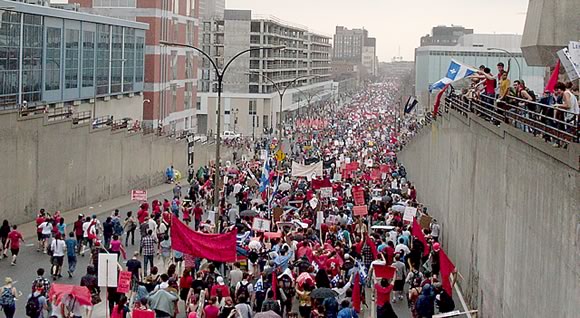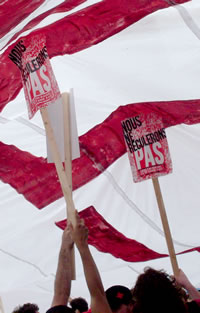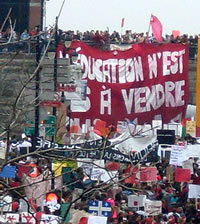by Eric Haight
March 27, 2012
On March 22, 2012, Montreal saw its largest demonstration in recent history. Over 200,000 students from all over the province of Québec mobilized in downtown, weaving past the city’s university campuses, office buildings, and expressways. They were protesting the proposal to double tuition of post-secondary students in the next provincial budget, made by Quebec’s Conservative Party premier, Jean Cherest.

The demo brought out students from far-flung towns and cities as well as from Anglophone schools. Many came out for the first time. The mobilization was the largest yet of a province-wide unlimited general student that began in early March. While the strike began with a sizable minority of students involved, by March 22 it has grown to include 350,000 of the roughly 400,000 post-secondary students in Québec. It is the biggest student strike in recent memory, surpassing the student strike of 2005 and the anti-Iraq War protest of 2003.
The strike has been organized by CLASSE, which is a temporary strike coalition launched by the militant student union federation ASSE [website in French], and includes around 76,000 student members. CLASSE, like ASSE itself, is a federation of student union locals of college students, graduate students, and students in cegep, an intermediary school between high school and college that is unique to Québec. In Québec, as in Canada more generally, students have the legal right to organize and collectively bargain with the state and school administrators over tuition increases and the conditions of their education.
There are also two other large student union federations in Québec, which organize exclusively among students of particular levels: the FEUQ (Federation of University Students) and FECQ (Federation of Cegep Students). These have typically been the only federations with which the government will negotiate. Both FEUQ and FECQ have made large concessions during strikes against the wishes often of their own membership as well as the demands of ASSE, which has historically been excluded from participating in negotiations. Nonetheless, there has been unity in this strike, and FEUQ and FECQ local unions mobilized for the demo and joined the strike on March 22nd.
Demands and dynamics of the mobilization
While many FEUQ and FECQ have just joined the strike and are demanding a tuition freeze, CLASSE locals have been on indefinite strike since early March. CLASSE’s main demand is for free tuition, and the organization has been successful in bringing the demand for “Norwegian-style” higher education to the mainstream discourse of Québec, despite the relentless push towards privatization and higher tuition by the government.
During the strike, CLASSE has employed a diversity of creative tactics including a port occupation, pickets in front of classrooms, bridge blockades, and a feminist occupation of the office of the Federal Commission on the Status of Women. A day of street theatre actions has been planned for the week of March 26th to bring the movement out on the streets throughout the entire province.

The local unions of the CLASSE, in addition to meeting in weekly general assemblies, have sent delegates to meet as a “congress” every weekend since the strike began. The meetings are similar—in length and commitment to participatory democracy—as the general assemblies seen recently in the U.S. Occupy movement. However, compared with my very limited experience with Occupy general assemblies, it does seem that CLASSE assemblies are more focused (i.e. you must be a member of an academic department, cegep, or college student union to participate), and more structured (i.e. CLASSE has compiled its own version of meeting process rules, formal motions are posted as a google doc for all to see before and during meetings, lots of discussion about motions occurs prior to meetings). Since general assemblies have been the basic decision units of the student union federations CLASSE, FEUQ, and FECQ for years, it may be that there has been more experience with the type of decision-making process.
When I talked to my friends that are on strike in Québec about whether they think that the strike will succeed, their main fear was that strike will end in the same way it did during the general strike of 2005: the FEUQ and FECQ will negotiate a weak deal with the government behind the backs of students. They fear that the more militant demands made by ASSE and now CLASSE like free tuition, guarantees against the underfunding and creeping privatization of cegeps, and free childcare for student parents will only have a chance if efforts to include a “minimum agreement” amendment in the general assemblies of FEUQ and FECQ local unions that permits CLASSE to enter negotiations as a third seat at the table succeed, and/or if a movement takes off amongst rank-and-file union members to vote down the concessions and continue the strike. A telling sign is that members of the fine arts student union at Concordia, a FEUQ local, have already voted to continue the strike and are considering affiliating with the CLASSE.
One important difference from the last large general strike in 2005 is that repression of protest has increased. Over the past month police have repeatedly divided demonstrations and fired flash grenades at protesters. While this sort of repression has been seen recently in the U.S. (with the repression against Occupy Oakland as one notorious example), it has been a startling and growing concern of activists in Québec. At a demonstration last week a protester was hospitalized after being hit by a flash grenade and may lose sight in one of his eyes. On March 23, the administration of Concordia University sent out an email to the campus body threatening academic penalties, possible expulsion, and lawsuits against the Concordia Student Union if they continue picketing classrooms and urging students and faculty from entering class, and trespassing fines for non-Concordia students. Concordia has been, by the painstaking effort of administrators, free of much campus activism since the Netanyahu riots of 2002 (see the interesting documentary “Discordia”). It remains to be seen whether the intimidation will work. In the short term, these threats pushed the FEUQ-affiliated Concordia Student Union to draft a letter, more militant that previous stances, defying the intimidation and supporting the right to strike.
Radical politics within the general strike

Over the past few days in Québec, I’ve had some interesting conversations about the politics of the strike movement. According to activists I spoke with, apart from the reformist politics of FEUQ and FECQ, who are affiliated with mainstream political parties and whose highest demand is for a tuition freeze, there are several tendencies seeking to push the strike further. There are anarcho-syndicalists organized around NEFAC (Northeastern Federation of Anarchist Communists), anarcho-insurectionists, and a newer grouping, influenced by Marxist Critical Theory and organized into a strike caucus called Critical Student Force. While all groups have serious differences over ideology, strategy, and tactics, together they make up, along with radical feminists, and independent radical activists, a small but dynamic radical pole within the strike movement, both within CLASSE and as activists pushing their unions left within FEUQ and FECQ.
Radicals seem to have added a lot of depth to the discourse around the strike, and there is general agreement that the tuition hikes are simply a local manifestation of the political push of the ruling class globally for austerity. However, it is also noteworthy that, at a Congress of the CLASSE I attended on Saturday March 24, there was controversy surrounding the fact that the executive committee denied the publication of letters of solidarity from Latin American student unions because they letters explained the student struggle within an anti-imperialist and anti-capitalist perspective. CLASSE, unlike the federation ASSE which sponsored its formation and whose local unions make up many of CLASSE’s constituents, has forbidden the use of explicitly anti-capitalist rhetoric within its publications for fear of being marginalized within the broader student movement.
The 2012 Québec student strike marks an historic point in the Canadian student movement and in the growing global resistance to austerity. The coming weeks will prove decisive and depend largely on the complexities of the political moment in Québec. Either way, the strike provides a wealth of lessons for anti-austerity for student and working class activists in the United States.

Comments
2 responses to “A Report from the Québec Student Strike”
Here are a few small corrections and updates to the article from a friend active in the Quebec student strike:
– Jean Charest is the prime minister, yes, but from the Quebec Liberal Party (the Conservatives, it’s the federal state)
– ” a province-wide unlimited general student that began in early March” and ”While many FEUQ and FECQ have just joined the strike and are demanding a tuition freeze, CLASSE locals have been on indefinite strike since early March” : the unlimited strike movement began, in fact, in mid-february (13th)
– ”These have typically been the only federations with which the government will negotiate” : that’s debatable (it’s not a mistake, i’m just saying)… the government does sit and talk and negociate with ASSÉ, but during the 2005 strike they were just ignored, because of its ”violent” members (anyway..)
– ”Since general assemblies have been the basic decision units of the student union federations CLASSE, FEUQ, and FECQ for years,” : in fact, FEUQ and FECQ are criticized especially because their general assemblies are fake and often non-decisionnal, non-autonomous. Their executives have the real power. I’m very sorry for that. That’s why the deal they did in 2005 was so scandalous, they didn’t even consult their own members
– ”The strike has been organized by CLASSE, which is a temporary strike coalition launched by the militant student union federation ASSE [website in French], and includes around 76,000 student members” : its 87,654 members
-”A telling sign is that members of the fine arts student union at Concordia, a FEUQ local, have already voted to continue the strike and are considering affiliating with the CLASSE.” : yep, and 2 more associations from concordia : the graduate students association and Geograds.
-Eric H.
Good article on a very important struggle.
In Québec students do indeed have the legal right to organize (there’s a law governing the formation and accreditation of student associations). But student associations don’t have a legal right to collective bargaining in the way that certified unions do.
Also, to call the politics of the leaderships of FEUQ and FECQ reformist is too generous! Supporters of the Parti Quebecois (PQ) dominate both, and the PQ is a neoliberal party.